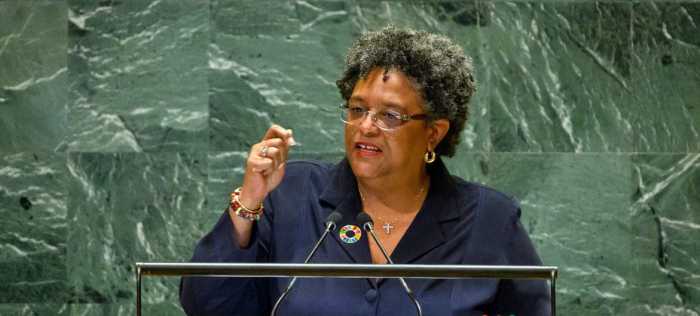ILLUSTRATION BY MICHAEL SHIREY
When Indiana Governor Mike Pence, a Republican social conservative, signed the Religious Freedom Restoration Act (RFRA) on March 26, he seemed to understand instinctively that it didn’t pay to make a big show of it but apparently he was confident he could duck any major blowback. The private, invitation-only ceremony was attended almost exclusively by religious leaders, including some outspoken in their opposition to LGBT rights, but was closed to the press.
If Pence thought that would keep the new law under the radar, he catastrophically miscalculated. For nearly a week since the signing, the Indiana law has been a headline-grabbing national story, with most of the media characterizing the law as giving Indiana businesses and individuals a license to discriminate — particularly against the LGBT community, who unlike many other groups lack any specific state or federal civil rights protections there. The law, story after story noted, was the nation’s most sweeping law empowering businesses and individuals to claim religious exemptions from complying with state and local law.
It soon became clear Pence had not made the sale for Indiana’s RFRA. On April 2, with great fanfare the State Legislature’s Republican leadership announced a “fix” to the bill they said would address complaints it could be used as pretext to discriminate against the LGBT community. Senate President David Long and House Speaker Brian Bosma said they had the votes –– as well as the support of business and LGBT leaders –– to promptly deliver an amended bill for the governor’s signature.
However, Freedom Indiana, a coalition of LGBT and allied groups, legislative Democrats, and at least one business critic of the bill noted the solution only eliminated the problems created over the past week, it did not affirmatively offer statewide protections based on sexual orientation and gender identity. In many parts of Indiana, there are still no prohibitions against anti-LGBT discrimination — and nobody there needs a religious exemption to justify discriminatory practices.
Meanwhile, several leading anti-gay groups that were behind the new law quickly cried foul in response to the legislative fix.
The immediate crisis in Indiana, then, may not be fully resolved until the Senate and House of Representatives there vote later today or tomorrow. [Editor's note: Late in the day on April 2, Pence signed the amended bill into law.]
 Pence Stumbles in His Original Defense
Pence Stumbles in His Original Defense
Three days after signing the measure last week, Pence tried using the platform of the ABC Sunday morning news program “This Week with George Stephanopoulos” to put what by then was an exploding controversy to rest. Pence aimed to buttress his claim that “this bill is not about discrimination,” but the nearly 11 and a half-minute interview was a debacle. The governor repeatedly refused to answer Stephanopoulos’ point-blank questions as to whether the law would allow businesses to discriminate against gay customers — or even whether the law should allow that.
Pence quickly canceled other media appearances he had scheduled. The following morning, Senate President Long and House Speaker Bosma appeared before the press in Indianapolis in an effort to salvage the case for the bill they just a week before had hustled through to passage. The two made little secret of their view that Pence had seriously fumbled in his Sunday
ABC appearance.
Not only was the governor thrown under the bus by legislative allies who crafted the bill he signed, he also faced criticism from Hoosier Republicans who never thought the bill was a good idea in the first place. Indianapolis Mayor Greg Ballard, a Republican, warned Pence in advance not to sign the bill, arguing it sends “the wrong signal.”
“Indianapolis strives to be a welcoming place that attracts businesses, conventions, visitors, and residents,” Ballard said. “We are a diverse city, and I want everyone who visits and lives in Indy to feel comfortable here.”
Former Senator Richard Lugar, a Republican who served Indiana for 36 years in Washington after spending eight years as Indianapolis mayor, told the New York Times, “I would not have passed this to begin with.”
 And Mitch Daniels, Pence’s GOP predecessor as governor and now the president of Purdue University, told the Indianapolis Star, “I guess the one thing I will say is a lot of people are heartsick about this. For those of us who feel like we spent years building up a great business climate and reputation for the state, you hate to see anything damage it in the way, at least for the moment, it has.”
And Mitch Daniels, Pence’s GOP predecessor as governor and now the president of Purdue University, told the Indianapolis Star, “I guess the one thing I will say is a lot of people are heartsick about this. For those of us who feel like we spent years building up a great business climate and reputation for the state, you hate to see anything damage it in the way, at least for the moment, it has.”
Daniels hit on the most striking aspect of how the Indiana fracas unfolded — the widespread and unusually vocal criticism that Indiana is facing from the business community.
 Business Speaks Out
Business Speaks Out
SalesForce, a $40 billion worldwide cloud computing company based in San Francisco, has been among the most outspoken, with its founder and CEO Mark Benioff taking to Twitter to warn, “We are forced to dramatically reduce our investment in IN based on our employee's & customer's outrage over the Religious Freedom Bill,” and “Today we are canceling all programs that require our customers/ employees to travel to Indiana to face discrimination.”
Prior to Pence signing the law, Gen Con, a gaming convention that is annually Indianapolis’ largest trade show, threatened to pull out if he did so, and the Disciples of Christ denomination similarly warned it might cancel a scheduled 2017 convention in that city — a threat it followed through with on April 1. On March 30, the American Federation of State, County & Municipal Employees also jettisoned its plans for a fall convention in Indianapolis.
The NCAA, which holds its Men’s Final Four Basketball Championship in Indianapolis beginning April 4, posted a statement on its website from its president, Mark Emert, saying, “We are especially concerned about how this legislation could affect our student-athletes and employees. We will work diligently to assure student-athletes competing in, and visitors attending, next week’s Men’s Final Four in Indianapolis are not impacted negatively by this bill. Moving forward, we intend to closely examine the implications of this bill and how it might affect future events as well as our workforce.”
In a tweet addressed to the governor, Jason Collins, the out gay retired Brooklyn Nets player, asked, “.@GovPenceIN, is it going to be legal for someone to discriminate against me & others when we come to the #FinalFour?”
 The measure Pence signed was also criticized by the Indiana Chamber of Commerce and employers with local workforces including Alcoa, Cummins, and Eli Lilly. And Indiana drew an avalanche of criticism from other US corporate giants, with Apple’s out gay chief Tim Cook taking to the Washington Post on March 29 to urge business leaders to stand up to the type of discrimination the state’s new law represents. The Human Rights Campaign noted that Cook’s call was quickly heeded by American Airlines, Levi Strauss, Microsoft, Orbitz Worldwide, Starwood Hotels & Resorts, Symantec Corporation, and Wells Fargo.
The measure Pence signed was also criticized by the Indiana Chamber of Commerce and employers with local workforces including Alcoa, Cummins, and Eli Lilly. And Indiana drew an avalanche of criticism from other US corporate giants, with Apple’s out gay chief Tim Cook taking to the Washington Post on March 29 to urge business leaders to stand up to the type of discrimination the state’s new law represents. The Human Rights Campaign noted that Cook’s call was quickly heeded by American Airlines, Levi Strauss, Microsoft, Orbitz Worldwide, Starwood Hotels & Resorts, Symantec Corporation, and Wells Fargo.
Perhaps nothing, however, stung as badly as a weekend statement from Bill Oesterle, CEO of the Indianapolis-based crowd-sourced business review website Angie’s List. The company, Oesterle said, was halting plans to expand its corporate headquarters in that city and would “begin reviewing alternatives for the expansion of its headquarters immediately.”
By March 31, the political ground had fallen out from under Pence, with Indianapolis insiders telling reporters that the governor’s political future — which was assumed to include the hope of a presidential run — was now in doubt. In an extraordinary front page editorial titled “Fix This Now,” the Indianapolis Star demanded quick action on ending the crisis that had enveloped Indiana.
 From Sunday forward, Pence gradually changed his tune. On ABC, he said there was “a tremendous amount of misinformation and misunderstanding around this bill,” and next charged its opponents had engaged in “shameless rhetoric about my state and about this law.” Repeating his contention that discrimination was not the intent of and had nothing to do with the new law, Pence said, “George, look, we're not going to change the law, okay?”
From Sunday forward, Pence gradually changed his tune. On ABC, he said there was “a tremendous amount of misinformation and misunderstanding around this bill,” and next charged its opponents had engaged in “shameless rhetoric about my state and about this law.” Repeating his contention that discrimination was not the intent of and had nothing to do with the new law, Pence said, “George, look, we're not going to change the law, okay?”
In an op-ed written the following day for publication in the Wall Street Journal on March 31, the governor gave no ground on the new law itself, but spoke more emphatically about his opposition to anything like a “license to discriminate,” writing, “I abhor discrimination… If I saw a restaurant owner refuse to serve a gay couple, I wouldn’t eat there anymore. As governor of Indiana, if I were presented a bill that legalized discrimination against any person or group, I would veto it.”
Hundreds of LGBT protesters and their allies converged on the Indiana State Capitol in Indianapolis on March 28. | FREEDOM INDIANA
A Governor In Retreat But events were fast getting ahead of Pence’s ability to find friendly TV venues and to write exculpatory opinion pieces. Just hours after the Journal op-ed hit the streets, the governor told a crowded press conference he wanted the Legislature to craft a fix before the week was out.
“After much reflection and in consultation with leadership in the General Assembly, I've come to the conclusion that it would be helpful to move legislation this week that makes it clear that this law does not give businesses a right to deny services to anyone,” he said.
The political test the governor now faced was in amending legislation so it would not have the impact that its most ardent supporters clearly intended — to exempt businesses from any public accommodations requirement to serve customers they’d rather not, particularly same-sex couples able to marry in Indiana since the Supreme Court declined review of a federal appeals court marriage equality ruling. The right-wing American Family Association, in comments to the New York Times, voiced fear that Pence’s effort to amend would mean “a capitulation that enshrines homosexual behavior as a special right in Indiana.”
Indeed, Democrats in Indiana said all along the only way to fix the new law is to provide specific provisions barring discrimination on the basis of sexual orientation and gender identity in state law — something that surely never in his wildest dreams was on Pence’s agenda.
 On April 1, the Indianapolis Star reported that Republican legislative leaders were meeting with business and sports executives to review a proposed amendment to make clear that the new law does not, in the newspaper’s words, authorize any business or person “to refuse to offer or provide its services, facilities, goods, or public accommodation to any member of the public based on sexual orientation or gender identity, in addition to race, color, religion, ancestry, age, national origin, disability, sex, or military service.”
On April 1, the Indianapolis Star reported that Republican legislative leaders were meeting with business and sports executives to review a proposed amendment to make clear that the new law does not, in the newspaper’s words, authorize any business or person “to refuse to offer or provide its services, facilities, goods, or public accommodation to any member of the public based on sexual orientation or gender identity, in addition to race, color, religion, ancestry, age, national origin, disability, sex, or military service.”
Freedom Indiana, the coalition opposed to its enactment, initially faulted the lack of specific affirmative nondiscrimination protections based on sexual orientation and gender identity. “According to current media reports, the proposal being considered falls far short of these principles, leaving the door wide open for discrimination,” the group said in a written statement.
Meanwhile, the American Family Association, warning that the Legislature is considering “water-down” language to last week’s law, urged its supporters to contact their legislators, and pray for them. By April 2, the group’s website led with a message titled “Homosexual Zealots to Christians in Indiana: Back to the Plantation.”
Advance America, a leading anti-gay player in creating the Indiana Legislation, today headlined its website, “Legislature About to Destroy Religious Freedom Protection in Indiana!”
But, also this morning, Freedom Indiana conditionally endorsed the fix announced by legislative leaders.
“The changes proposed by the Legislature represent a step in the right direction that takes us closer to achieving our goal of passing the Fairness for All Hoosiers Act,” Katie Blair, the group’s campaign manager said in a written statement. “Today, the harm has been lessened, but we have not reached the day when LGBT Hoosiers can be assured that they can live their lives with freedom from discrimination. It’s long past time to enact a comprehensive nondiscrimination law, and we must continue to work to ensure, once and for all, that the RFRA cannot be used to discriminate against or hurt anyone.”
 Significantly, Angie’s List took a tougher tone on the proposed legislative amendment.
Significantly, Angie’s List took a tougher tone on the proposed legislative amendment.
“Our position is that this ‘fix’ is insufficient,” CEO Oesterle said in a written statement. “There was no repeal of RFRA and no end to discrimination of homosexuals in Indiana. Employers in most of the state of Indiana can fire a person simply for being Lesbian, Gay, Bisexual, Transgender or Questioning. That’s just not right and that’s the real issue here.”
With these divergent responses from all sides in the Indiana fracas, the next few hours or days will be critical.
The Wider Impact of the Indiana Debacle Whether or not Indiana is headed out of the political crisis of its own making, its experience may already have altered the course of efforts underway in other states to push back on gay rights in the wake of marriage equality’s dramatic advance in the past six months. A recent tabulation by the Human Rights Campaign of state-level measures targeting the LGBT community — through religious exemption laws, nullification of local protections that go beyond state law provisions, bills that target the use of sex-segregated facilities like bathrooms and locker rooms by transgender people, and laws promoting conversion therapy for LGBT youth — identified 85 bills pending in 26 legislatures across the country.
But on April 1, Arkansas’ Republican governor, Asa Hutchinson, announced he was not prepared to sign legislation recently passed there that is similar to Indiana’s, saying he wanted to narrow its scope to match the provisions of the 1993 federal Religious Freedom Restoration Act. [Editor's note: On April 2, Hutchinson signed a revised bill amended along the lines he demanded.] Hutchinson’s wariness in following Pence’s lead is notable given that it was only in February that Arkansas enacted a measure that bars local governments from providing any civil rights protections not established in state law, after several localities adopted LGBT non-discrimination ordinances.
Just as the quagmire Pence finds himself in has led to calls for statewide LGBT nondiscrimination protections in Indiana, the nationwide debate has focused attention on the lack of any such protections in more than two-dozen states.
 An April 1 letter from roughly 40 high tech leaders, responding to the spate of anti-LGBT bills that have popped up, instead urged corrective actions by the laggard states.
An April 1 letter from roughly 40 high tech leaders, responding to the spate of anti-LGBT bills that have popped up, instead urged corrective actions by the laggard states.
“To ensure no one faces discrimination and ensure everyone preserves their right to live out their faith, we call on all legislatures to add sexual orientation and gender identity as protected classes to their civil rights laws and to explicitly forbid discrimination or denial of services to anyone,” read the letter from leaders of companies including Yelp, SalesForce, Twitter, Ebay, Zillow, and Cisco Systems. “Anything less will only serve to place barriers between people, create hurdles to creativity and inclusion, and smother the kind of open and transparent society that is necessary to create the jobs of the future. Discrimination is bad for business and that's why we've taken the time to join this joint statement.”
At a moment when the LGBT community faces a wave of backlash, Indiana badly overplayed the social conservatives’ hand. The counter-backlash seen in the past week was unprecedented in its speed and breadth. Whether that’s enough to turn a critical corner remains to be seen.




































